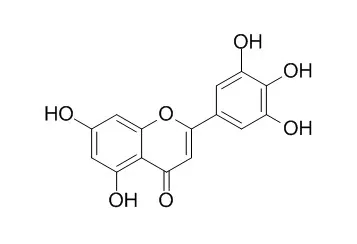| Kinase Assay: |
| Environmental toxicology, 2017, 32(7-8):2032-2040. | | Tricetin inhibits human osteosarcoma cells metastasis by transcriptionally repressing MMP-9 via p38 and Akt pathways.[Reference: WebLink] | Tricetin, a dietary flavonoid, has cytostatic properties and anti-metastasis activities in various cancer cells. However, the detailed impacts and underlying mechanisms of Tricetin on human osteosarcoma cell metastasis are still unclear.
METHODS AND RESULTS:
Here, the hypothesis that Tricetin possesses the anti‐metastatic effects on human osteosarcoma cells was tested. The effects of Tricetin on cell viability, motility, migration, and invasion in human osteosarcoma U2OS and HOS cells were investigated. Gelatin zymography, western blotting, polymerase chain reaction (PCR), and the luciferase assay were used to further explore the underlying mechanisms involved in anti‐metastatic effects in U2OS cells. Their results showed that Tricetin, up to 80 uM without cytotoxicity, attenuated U2OS and HOS cells motility, invasiveness, and migration by reducing matrix metalloproteinase (MMP)-9 enzyme activities. In U2OS cells, Tricetin decreased MMP-9 protein and mRNA expressions, which was confirmed by real-time PCR. Next, Tricetin reduced phosphorylation of p38 and Akt, but no effect on phosphorylation of ERK1/2 and JNK.
CONCLUSIONS:
In conclusion, Tricetin possesses the anti‐metastatic activity of osteosarcoma cells by transcriptionally repressing MMP-9 via p38 and Akt signaling pathways. This may be potentially useful as anti‐metastatic agents for osteosarcoma chemotherapy. |
|






 Cell. 2018 Jan 11;172(1-2):249-261.e12. doi: 10.1016/j.cell.2017.12.019.IF=36.216(2019)
Cell. 2018 Jan 11;172(1-2):249-261.e12. doi: 10.1016/j.cell.2017.12.019.IF=36.216(2019) Cell Metab. 2020 Mar 3;31(3):534-548.e5. doi: 10.1016/j.cmet.2020.01.002.IF=22.415(2019)
Cell Metab. 2020 Mar 3;31(3):534-548.e5. doi: 10.1016/j.cmet.2020.01.002.IF=22.415(2019) Mol Cell. 2017 Nov 16;68(4):673-685.e6. doi: 10.1016/j.molcel.2017.10.022.IF=14.548(2019)
Mol Cell. 2017 Nov 16;68(4):673-685.e6. doi: 10.1016/j.molcel.2017.10.022.IF=14.548(2019)